When applying for income based loans, it is important to gather the necessary documentation to support your loan application. Lenders typically require specific documents that serve as proof of income and help determine your eligibility and loan amount.
Key documents that are commonly requested include:
- Pay stubs: These provide evidence of your regular income from employment.
- W-2 forms from the last two years: These show your earnings and tax withholdings.
- Signed federal tax returns: These provide a comprehensive view of your income, deductions, and credits.
- Bank statements: These demonstrate your financial transactions and available funds.
- Documentation of other sources of income: If you have additional income from rental properties, investments, or other sources, you may need to provide supporting documentation.
- Proof of identity: A valid government-issued ID, such as a driver’s license or passport, is typically required.
- Certificate of housing counseling or home buyer education: Depending on the loan program, you may need to complete a housing counseling course or education program to qualify.
Gathering accurate and complete documentation is crucial to ensure a smooth loan approval process. By providing the required documents, you can demonstrate your financial stability and increase your chances of loan approval.
Key Takeaways:
- When applying for income based loans, lenders require specific documents to prove your income and determine your eligibility.
- The key documentation includes pay stubs, W-2 forms, signed federal tax returns, bank statements, documentation of other income sources, proof of identity, and potentially a certificate of housing counseling or home buyer education.
- It is important to gather accurate and complete documentation to ensure a smooth loan approval process.
Application Process for Income Based Loans
Applying for income based loans is a relatively straightforward process that can be done online or through a paper request form. The online application method is often faster and more convenient. To begin your income based loan application, you will need to submit an income-driven repayment application. This application can be accessed through the Federal Student Aid website. Alternatively, you can download a paper request form and submit it by mail or fax.
The application requires various personal and financial information to determine your eligibility for income-based repayment. You will need to provide details such as your address, email, and phone number. Additionally, you will be required to provide information about your family size, tax returns or proof of income, and if applicable, your spouse’s income.
Once you have completed the application and submitted it, your loan servicer will confirm receipt and put your loans into a temporary payment pause known as forbearance. This pause ensures that you do not have to make payments while your application is being processed. It is important to note that forbearance is not the same as loan forgiveness, and interest may continue to accrue during this period.
Another essential step in the income based loan application process is recertification. Recertification is an annual requirement to maintain eligibility for income-driven repayment. It involves updating your income information to ensure that your loan repayment plan remains based on your current financial situation. Failure to recertify may result in a loss of income-driven repayment benefits and a return to the standard repayment plan, which often comes with higher monthly payments.
Benefits of Applying Online
Applying for income based loans online offers several advantages. Firstly, it is faster and more convenient than using the traditional paper request form. Online applications can be completed at your own pace and submitted electronically, saving time and reducing the risk of postal delays or loss. Additionally, the online application system often provides helpful prompts and guidance to ensure that you provide all the necessary information.
Moreover, applying online allows you to self-report your income, which can streamline the application process. Rather than waiting for verification from your employer or tax records, you have the opportunity to report your income as accurately as possible. However, keep in mind that inaccurate self-reporting may have consequences, such as loan denial or repayment plan adjustments in the future.
In conclusion, applying for income based loans involves submitting an income-driven repayment application, either online or through a paper request form. The online application process is often faster, more convenient, and allows for self-reporting of income. It is essential to recertify annually to maintain eligibility for income-driven repayment. By following the application process and providing accurate and complete information, you can increase your chances of securing income based loans.
Documentation Required for Income Based Loan Approval
To get income-based loan approval, lenders will require documentation to verify the borrower’s income. Providing accurate and complete documents is crucial in this process, as lenders use this information to determine eligibility and loan amounts. Failure to provide the necessary documentation can result in loan rejection or unexpected complications in the future.
Here are the key documents typically required for income-based loan approval:
- Pay stubs: These documents provide evidence of your current income from employment.
- W-2 forms: Lenders often request W-2 forms from the last two years to verify your income history.
- Signed federal tax returns: This helps confirm your income as reported to the IRS.
- Bank statements: Lenders may ask for recent bank statements to verify your financial stability and account balances.
It is important to include every page of multi-page documents and ensure that all documentation is accurate and up to date. Missing or incomplete pages can raise concerns and delay the loan approval process.
The accuracy and completeness of your documentation play a crucial role in securing income-based loan approval. Make sure to provide every required document and keep them updated to avoid any potential roadblocks.
Having accurate documentation not only helps lenders verify your income but also provides a clear and transparent picture of your financial situation. This information is essential for lenders to make informed decisions about your loan eligibility and amount.
Remember, providing accurate and complete documentation is your responsibility as a borrower. By ensuring that all required documents are in order, you can increase your chances of a smooth loan approval process and avoid any surprises or complications down the line.
[Caption: Image illustrating the importance of accurate and complete documentation for income-based loan approval.]
Next, we will explore the specific additional documentation requirements for self-employed and irregular income borrowers. Stay tuned!
Self-Employed and Irregular Income Borrowers

Self-employed borrowers and individuals with irregular income face unique challenges when applying for income based loans. Due to their specific situations, they may be required to provide additional documentation to support their loan application.
When applying for an income based loan, it is crucial for self-employed borrowers to demonstrate their income stability and ability to repay the loan. Lenders often request specific documents to assess their financial situation accurately.
Some potential additional documentation requirements for self-employed borrowers and individuals with irregular income include:
- Tax Returns: Providing recent tax returns, including all schedules, can help lenders verify income consistency and determine eligibility.
- Profit and Loss Statements: Self-employed borrowers should prepare profit and loss statements to provide a comprehensive view of their business income.
- Bank Statements: Submitting bank statements showing business income can further support the borrower’s financial stability.
- Other Financial Records: Depending on the lender and the borrower’s specific situation, additional financial records, such as invoices, contracts, or proof of recurring payments, may be requested.
It is essential for self-employed borrowers and individuals with irregular income to communicate their specific situation with loan officers or housing counselors. By seeking guidance and understanding the lender’s requirements, borrowers can ensure they provide the necessary additional documentation for a successful loan application.
Expert Tip: Discussing your specific situation with loan officers or housing counselors can help you navigate the loan application process and ensure you provide all the necessary documentation for a successful application.
| Additional Documentation for Self-Employed Borrowers | Purpose |
|---|---|
| Tax Returns | Verify income consistency and eligibility |
| Profit and Loss Statements | Provide a comprehensive view of business income |
| Bank Statements | Support financial stability |
| Other Financial Records | Additional documents specific to the borrower’s situation |
Organization and Updates during the Loan Application Process
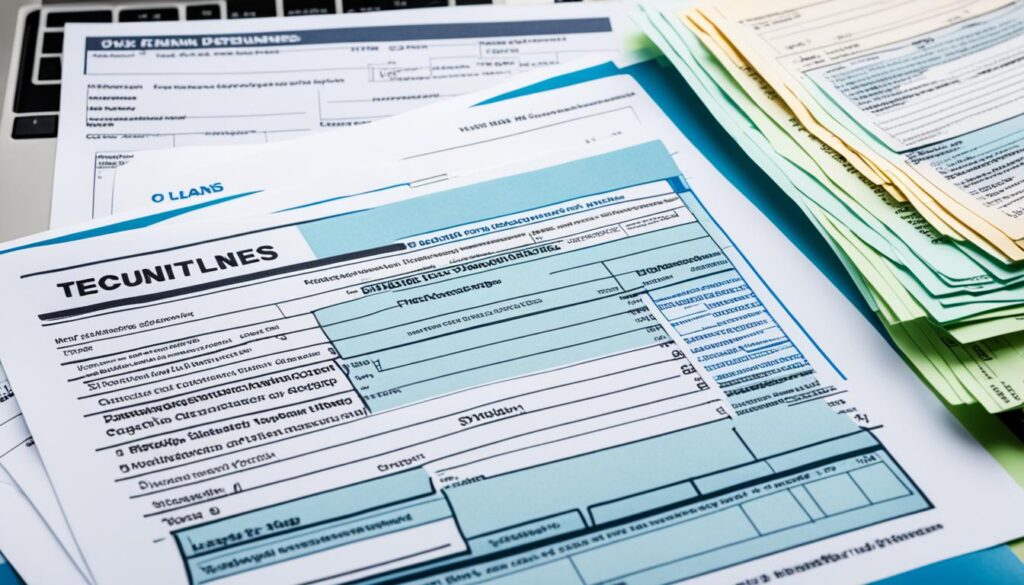
When it comes to applying for a loan, staying organized and keeping your documentation up to date is crucial. Lenders rely on the information provided by borrowers to make lending decisions, so it’s important to ensure that all your documents are complete and accurate.
For self-employed borrowers or individuals with irregular income, it’s especially important to regularly update your loan application packet with recent information. This includes updating bank statements, pay stubs, and any other relevant financial documents. By keeping your information current, you can provide lenders with a clear picture of your financial situation.
Here are a few tips to help you stay organized and ensure a smooth loan application process:
- Create a checklist: Make a list of all the documents you need to gather and cross them off as you collect each one. This will help you keep track of what you still need to obtain.
- Use folders or digital storage: Keep your documents organized in physical folders or utilize online storage platforms. This will make it easier to access and update your information when needed.
- Label your documents: Clearly label each document with the date it was generated to ensure you’re using the most recent version. This will prevent any confusion or delays during the application process.
Being organized and having complete and accurate documents will not only help expedite the loan approval process but also provide lenders with confidence in your ability to manage your finances responsibly.
“Proper organization and regular updates to your loan application can significantly impact the speed and success of the loan approval process.”
Additionally, if you’re a self-employed borrower or someone with irregular income, recent bank statements are crucial in showcasing your financial stability. These statements provide lenders with insight into your cash flow, which is essential for assessing your loan eligibility and repayment capacity.
By staying organized and keeping your loan application documents up to date, you can demonstrate your financial responsibility and improve your chances of approval. Regularly updating your information shows lenders that you are actively managing your finances and provides them with accurate data to evaluate your loan application.
| Document | Required |
|---|---|
| Completed loan application form | Yes |
| Proof of identification (driver’s license, passport, etc.) | Yes |
| Recent pay stubs | Yes |
| W-2 forms from the past two years | Yes |
| Signed federal tax returns for the past two years | Yes |
| Bank statements for the past three months | Yes |
| Proof of additional income (if applicable) | No, but recommended |
| Proof of address (utility bill, lease agreement, etc.) | Yes |
Income Documentation for Single Borrowers and Married Borrowers
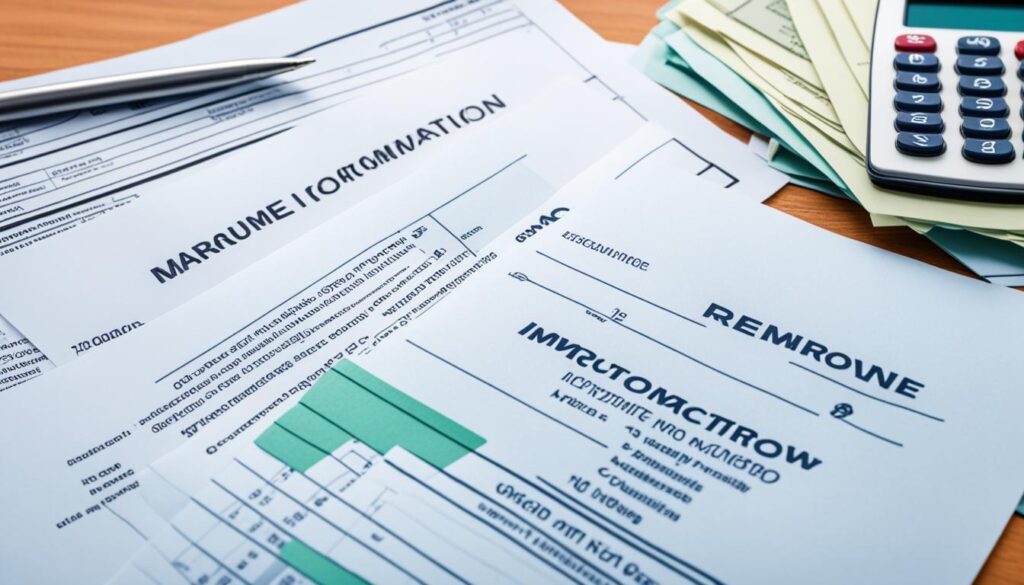
When applying for income based loans, it is important for borrowers to understand the specific income documentation requirements based on their marital status. Single borrowers and married borrowers have different criteria for documenting their income.
Income Documentation for Single Borrowers
Single borrowers need to provide documentation of their taxable income. This includes income from various sources such as:
- Employment
- Unemployment benefits
- Dividends and interest
- Other taxable sources
These sources of income should be accurately documented to ensure that the borrower’s financial situation is properly assessed.
Income Documentation for Married Borrowers
Married borrowers filing jointly have additional income documentation requirements as they need to provide documentation for both themselves and their spouse. The taxable income for both individuals should be included in the documentation.
It is important for both single and married borrowers to provide documentation for all sources of taxable income. However, it is worth noting that untaxed income, such as child support or public assistance, does not need to be documented.
Income documentation plays a crucial role in determining eligibility and loan amounts for income based loans. Lenders rely on these documents to verify the borrower’s financial situation and make informed lending decisions.
Here is an example of how the income documentation requirements can vary for single and married borrowers:
| Income Source | Single Borrowers | Married Borrowers |
|---|---|---|
| Employment | Required | Required for both individuals |
| Unemployment Benefits | Required | Required for both individuals |
| Dividends and Interest | Required | Required for both individuals |
| Other Taxable Sources | Required | Required for both individuals |
| Untaxed Income (e.g., child support, public assistance) | Does not need to be documented | Does not need to be documented |
By understanding the specific income documentation requirements based on their marital status, borrowers can ensure they provide accurate and complete documentation, increasing their chances of a successful loan application.
Income Documentation for Married Borrowers Filing Separately
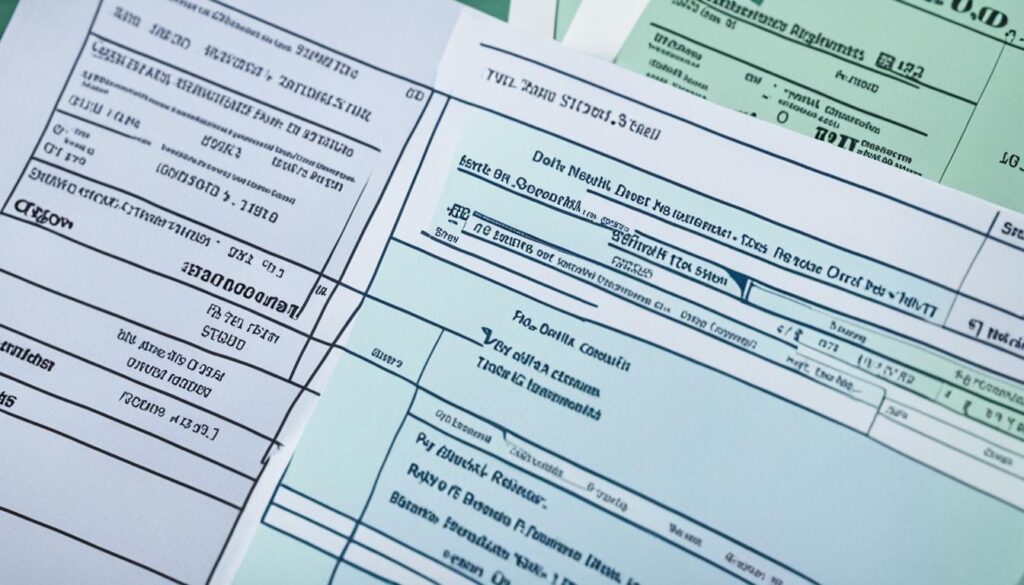
Married borrowers filing separately have specific income documentation requirements when applying for loans. Both the borrower and their spouse must provide documentation of their taxable income, but the documentation for untaxed income is not required. Accurately documenting income is crucial to ensure that lenders have all the necessary information for the loan approval process.
When married borrowers file separately, each individual’s taxable income must be documented. This includes income from employment, investments, rental properties, and other taxable sources. Both spouses should provide the necessary documentation to verify their reported incomes.
However, if either the borrower or their spouse does not have any taxable income or only receives untaxed income, they are not required to provide documentation for those income sources. For example, if one spouse is not currently employed and does not have any taxable income, they would not need to provide documentation. The same applies to untaxed income such as child support or public assistance. It is important to note that lenders may still ask for additional information or clarification regarding the absence of taxable income or the sources of untaxed income.
The table below summarizes the income documentation requirements for married borrowers filing separately:
| Income Type | Documentation Required |
|---|---|
| Taxable Income | Documentation required for both the borrower and spouse |
| Untaxed Income | Documentation not required if only one spouse receives untaxed income |
Accurate documentation of income is essential to ensure lenders can properly assess a borrower’s financial situation. Providing complete and up-to-date documentation helps expedite the loan approval process and reduces the chances of any delays or misunderstandings. Remember to communicate any unique circumstances or questions to your loan officer or housing counselor to ensure all necessary information is provided.
Importance of Accurate and Complete Documentation
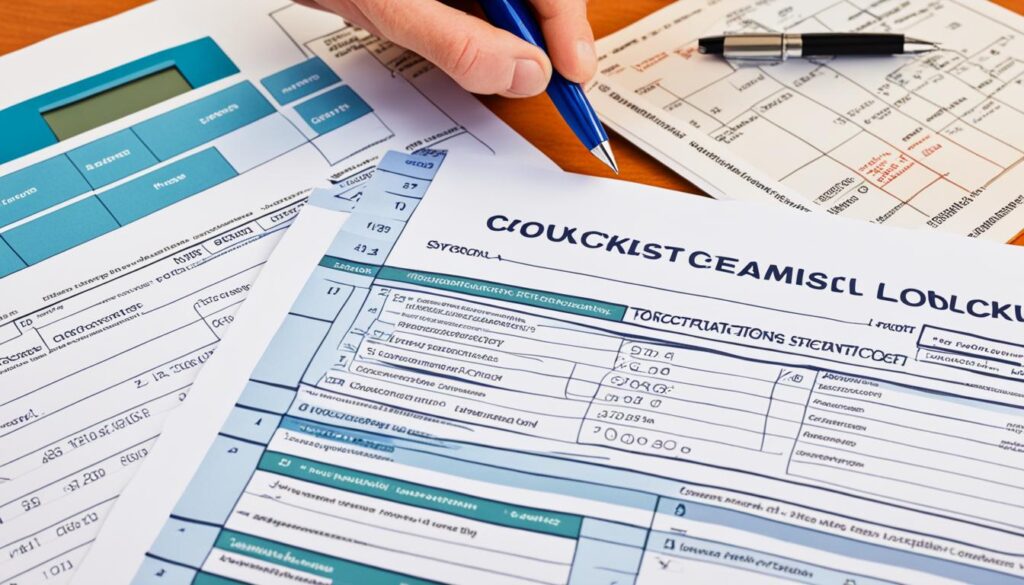
During the loan approval process, accurate and complete documentation plays a crucial role. Lenders heavily rely on these documents to verify the borrower’s income and make informed lending decisions. Failing to provide accurate or complete documentation can lead to delays in the loan approval process or even result in loan rejections. Therefore, it is essential to gather and submit all necessary documents required by lenders.
When submitting documentation, it is important to include every page of multi-page documents and ensure that the information provided is up to date. Inaccurate or outdated information could raise doubts about the borrower’s financial situation and create inconsistencies in income verification. By providing accurate and complete documentation, borrowers can instill confidence in the lender and expedite the loan approval process.
Additionally, keeping track of online access to documents can be beneficial. This allows borrowers to easily update information whenever required, ensuring the documentation remains accurate and up to date throughout the loan application process. By actively managing and organizing their documents, borrowers can demonstrate their commitment to the loan application process and increase their chances of a successful loan approval.
“Accurate and complete documentation is crucial for lenders to verify the borrower’s income and make informed lending decisions.”
By prioritizing accurate and complete documentation, borrowers can ensure a smooth loan approval process and increase their chances of securing the loan they need. Taking the time to gather and submit the necessary documents demonstrates responsibility and transparency, which are qualities lenders value when assessing a borrower’s financial capacity. Ultimately, providing accurate and complete documentation is an essential step in achieving successful loan approval.
Recertification for Income Based Loans
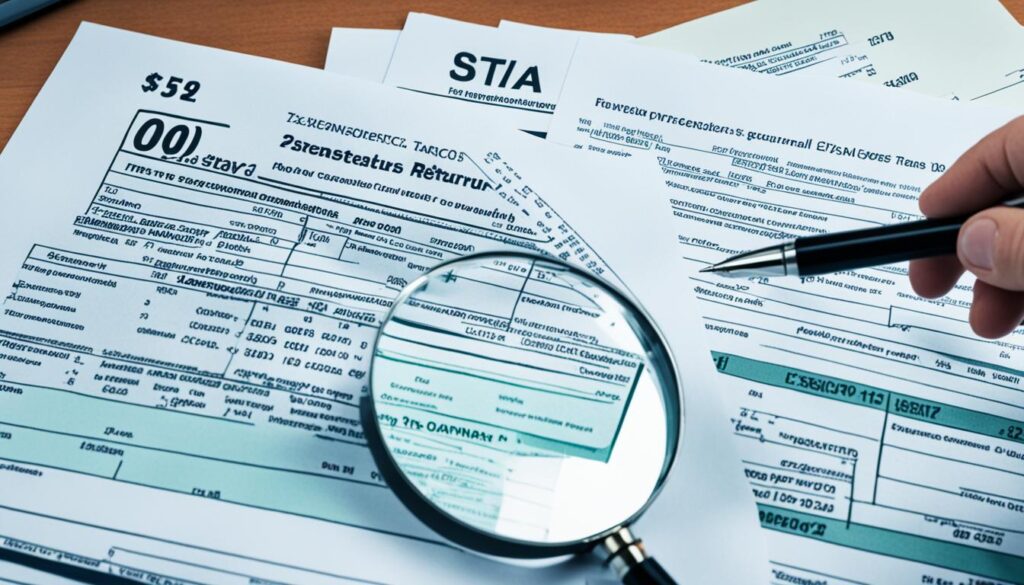
Recertification is a crucial step in maintaining eligibility for income based loans. Borrowers are required to recertify their income annually to continue their income-driven repayment plan. Failing to complete the recertification process can result in a return to the standard repayment plan, leading to higher monthly payments.
The recertification process is similar to the initial application process. Borrowers need to provide updated income information to ensure the accuracy of their loan repayment plan. Loan servicers will notify borrowers when recertification is due, usually on an annual basis.
Benefits of Recertification:
- Continued eligibility for income-driven repayment
- Lower monthly payments based on income
- Possible loan forgiveness after a certain repayment period
Recertification allows borrowers to maintain affordable monthly payments based on their income. It ensures that their loan repayment plan aligns with their current financial situation.
During the recertification process, borrowers will need to provide updated documentation that verifies their income. This may include recent pay stubs, tax returns, or other relevant financial records.
By completing the recertification process on time and submitting accurate documentation, borrowers can continue to benefit from income-driven repayment plans and avoid potential financial challenges.
| Recertification Process | Annual Recertification |
|---|---|
| Verify and update income information | Provide updated documentation |
| Submit recertification application | Review loan repayment plan |
| Receive confirmation from loan servicer | Ensure accurate monthly payments |
Completing the recertification process is essential for borrowers who wish to continue benefiting from income-driven repayment plans. It allows them to maintain affordable monthly payments that are based on their income, providing financial flexibility and ensuring loan sustainability.
Income-based loans, such as income-based loans available as secured or unsecured personal loans, work by assessing your ability to repay based on your income rather than solely relying on your credit history when determining approval. Lenders offering income-based loans as secured loans often require proof of your income to determine eligibility, and while they still perform a soft credit check, they place more emphasis on income and reliable income sources rather than your credit score.
These loans tend to have minimum income requirements that vary, but they can be a good option for borrowers with limited or bad credit but a reliable income, as they can help fund loans even if you have bad or no credit history. However, it’s important to note that income-based loans can impact your credit score and payments on your income-based loan should be manageable based on your income.
Additionally, many personal loans are based on your income, and some lenders offer income-based loans as secured loans, such as a home equity line of credit. Whether you’re applying for income-based loans or other personal loans based on your income, providing proof of your income and personal and financial details is crucial for approval.
If you have questions about income-based loans, lenders who approve loans for borrowers with good or excellent credit, or those with enough income to repay, can provide assistance in finding the right loan for you.
Also Read : How To Prequalify For A Personal Loan Fast
Conclusion
Applying for income based loans requires careful attention to the documentation requirements and proper adherence to the loan application process. Lenders typically request various documents that serve as proof of income, such as tax returns, pay stubs, and bank statements. By providing accurate and complete documentation, borrowers can increase their chances of a smooth loan approval process.
It is also important to note that recertification is necessary to maintain eligibility for income-driven repayment. Borrowers must update their income information annually to continue their loan repayment plan. Failure to recertify on time may result in a return to the standard repayment plan, potentially leading to higher monthly payments.
By understanding the importance of documentation, following the proper procedures, and staying organized throughout the loan application process, borrowers can enhance their chances of securing income based loans. As such, it is crucial to gather all required documents and ensure their accuracy, completeness, and timeliness. By doing so, borrowers can navigate the process effectively and achieve their desired loan approval.
FAQs
Q: What types of documentation are required for income-based loan applications?
A: When applying for an income-based loan, you will typically need to provide proof of income, such as pay stubs or tax returns. Lenders may also ask for personal identification, bank statements, and other financial documents to verify your ability to repay the loan.
Q: How do income-based loans work?
A: Income-based loans are designed to evaluate your ability to repay a loan based on your income rather than just your credit score. Lenders may consider your income, employment status, and other financial factors to determine your eligibility and loan terms.
Q: How can I apply for an income-based loan?
A: To apply for an income-based loan, you can contact a lender that offers such loans or apply online through their website. Be prepared to submit the required documentation and provide information about your income and financial situation.
Q: What is the difference between income-based loans and traditional loans?
A: Income-based loans focus more on your ability to repay the loan based on your income, while traditional loans often rely heavily on your credit score. Income-based loans may be more accessible to individuals with lower credit scores or irregular credit histories.
Q: Can I get an income-based personal loan with poor credit?
A: Yes, you may still qualify for an income-based personal loan even if you have poor credit. Lenders offering income-based loans often consider factors beyond just your credit score, such as your income stability and financial situation.
Q: What impact do income-based loans have on my credit score?
A: Income-based loans, like any other type of loan, can impact your credit score based on how you manage the loan. Making on-time payments and repaying the loan as agreed can help improve your credit score, while missed payments can negatively affect it.
Q: Are income-based loans a good option for personal finance?
A: Income-based loans can be a good option for individuals who may not qualify for traditional loans due to lower credit scores or variable income. These loans provide a way to access funds based on your ability to repay, helping you manage your finances effectively.
Source Links
- https://fsapartners.ed.gov/sites/default/files/attachments/dpcletters/GEN1618AttachIDRPlanRequest.pdf
- https://www.nerdwallet.com/article/loans/student-loans/how-to-submit-an-income-driven-repayment-application
- https://www.consumerfinance.gov/owning-a-home/prepare/create-a-loan-application-packet/